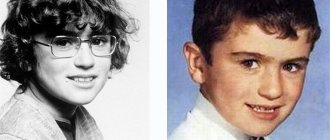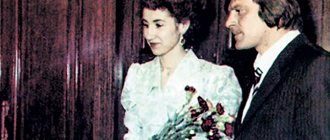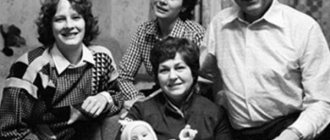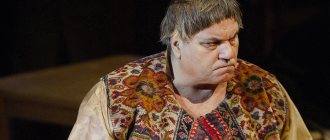Childhood
Fedor was born on February 1, 1873 in the city of Kazan. The singer's father, Ivan Yakovlevich Chaliapin, was a peasant originally from the Vyatka province. Mother, Evdokia Mikhailovna (maiden name Prozorova), was also a peasant from the Kumenskaya volost, where the village of Dudintsy was located at that time. In the village of Vozhgaly, in the Church of the Transfiguration of the Lord, Ivan and Evdokia got married at the very beginning of 1863. And only 10 years later their son Fyodor was born; later a boy and a girl appeared in the family.
My father worked in the zemstvo government as an archivist. Mom did hard day labor, washed people’s floors, and washed clothes. The family was poor, they barely had enough money to live on, so Fyodor was taught various crafts from an early age. The boy was sent to be trained by a shoemaker and turner, a woodcarver, a carpenter, and a copyist.
It also became clear from an early age that the child had excellent hearing and voice; he often sang along with his mother in a beautiful treble.
The Chaliapins' neighbor, church regent Shcherbinin, hearing the boy's singing, brought him with him to the Church of St. Barbara, and they sang the all-night vigil and mass together. After this, at the age of nine, the boy began singing in the suburban church choir, as well as at village holidays, weddings, prayer services and funerals. For the first three months, Fedya sang for free, and then he was entitled to a salary of 1.5 rubles.
Even then, his voice did not leave listeners indifferent; later Fedor was invited to sing in churches in neighboring villages. He also had a dream - to play the violin. His father bought him an instrument at a flea market for 2 rubles, and the boy began to learn to draw the bow on his own.
One day, the father came home very drunk and spanked his son for unknown reasons. The boy ran off into the fields out of resentment. Lying on the ground by the lake, he sobbed bitterly, and then he suddenly wanted to sing. As Fyodor sang the song, he felt his soul lighter. And when he fell silent, it seemed to him that the song was still flying nearby somewhere, continuing to live...
Childhood and youth
Fyodor Ivanovich Chaliapin was born in Kazan in 1873. His parents were visiting peasants. Father Ivan Yakovlevich moved from the Vyatka province, he was engaged in work unusual for a peasant - he served as a scribe in the zemstvo administration. And mother Evdokia Mikhailovna was a housewife.
Fyodor Chaliapin with his father and brother
As a child, little Fedya noticed a beautiful treble, thanks to which he was sent to the church choir as a singer, where he received the basic knowledge of musical literacy. In addition to singing in the temple, the father sent the boy to be trained by a shoemaker.
Having completed several classes of primary education with honors, the young man goes to work as an assistant clerk. Fyodor Chaliapin will later remember these years as the most boring in his life, because he was deprived of the main thing in his life - singing, since at that time his voice was going through a period of withdrawal. This is how the career of the young archivist would have gone on, if one day he had not attended a performance at the Kazan Opera House. The magic of art has forever captured the young man’s heart, and he decides to change his career.
Fyodor Chaliapin in his youth
At the age of 16, Fyodor Chaliapin, with his bass voice already formed, auditioned for the opera house, but failed miserably. After this, he turns to the drama group of V. B. Serebryakov, in which he is hired as an extra.
Gradually, the young man began to be assigned vocal parts. A year later, Fyodor Chaliapin performed the role of Zaretsky from the opera Eugene Onegin. But he does not stay long in the dramatic enterprise and after a couple of months he gets a job as a chorister in the musical troupe of S. Ya. Semyonov-Samarsky, with whom he leaves for Ufa.
Famous bass Fyodor Chaliapin
As before, Chaliapin remains a talented self-taught person who, after several comically disastrous debuts, gains stage confidence. The young singer is invited to a traveling theater from Little Russia under the direction of G.I. Derkach, with whom he makes a number of first trips around the country. The journey ultimately leads Chaliapin to Tiflis (now Tbilisi).
In the capital of Georgia, the talented singer is noticed by vocal teacher Dmitry Usatov, a former famous tenor of the Bolshoi Theater. He takes on a poor young man to fully support him and works with him. In parallel with his lessons, Chaliapin works as a bass performer at the local opera house.
Early years
Parents, despite poverty, cared about giving their son an education. His first educational institution was the Vedernikov private school, followed by the fourth Kazan parish and sixth elementary schools. Chaliapin graduated from the latter in 1885, receiving a certificate of merit.
In the summer of the same year, Fyodor worked in the zemstvo government as a clerk, earning 10 rubles a month. And in the fall, his father arranged for him to study in Arsk, where a vocational school had just opened. For some reason, young Chaliapin really wanted to leave the settlement; it seemed to him that a beautiful country was waiting for him ahead.
But soon the young man was forced to return home to Kazan, because his mother fell ill, and he had to take care of her and his younger brother and sister.
Here he managed to join a theater troupe that toured Kazan, he participated in performances as an extra. However, Fyodor’s father did not like this hobby; he told him: “You should go to the janitors, not to the theater, then you will have a piece of bread.” But young Chaliapin was simply a theater fan from the very day when he first attended the production of the play “Russian Wedding.”
F.I. Chaliapin on the opera stage
Roles in opera performances created by F.I. Chaliapin have always been inimitable. He was very picky about his roles. One of the best roles in the Russian repertoire was that of Boris Godunov in the opera of the same name by M.P. Mussorgsky.
In the foreign repertoire, perhaps, we can name four roles that went with him throughout his entire creative path. These are two Mephistopheles in the opera of the same name by A. Boito and the opera Faust by C. Gounod, Don Basilio in The Barber of Seville by G. Rossini and Don Quixote in the opera by G. Massenet.
The beginning of the theatrical journey
When the young man was 15 years old, he turned to the theater management with a request to audition him and accept him as a choir member. But at this age, Fyodor’s voice began to change, and during the audition he did not sing very well. Chaliapin was not accepted, but this did not in any way affect his love for the theater, it only grew stronger every day.
Finally, in 1889, he was accepted as an extra in Serebryakov’s drama troupe. At the beginning of 1890, Chaliapin performed for the first time as an opera singer. It was “Eugene Onegin” by P.I. Tchaikovsky, Zaretsky’s part. And in the fall, Fedor left for Ufa, where he joined the local operetta troupe, in many performances he got small roles:
- Stolnik in “Pebble” Moniuszko;
- Ferrando in Il Trovatore;
- Unknown in Verstovsky's Askold's Grave.
And when the theater season ended, a Little Russian traveling troupe came to Ufa, Fyodor joined it and went on tour to Russian cities, the Caucasus and Central Asia.
In Tiflis, Chaliapin met Professor Dmitry Usatov, who once served at the Imperial Theater. This meeting turned out to be vital for Fedor; the professor invited him to stay for his studies, and did not demand money from him for this. Moreover, he not only gave voice to the young talent, but also helped him financially. And at the beginning of 1893, Chaliapin made his debut at the Tiflis Opera House, where he worked for almost a year, performing the first bass parts.
At the end of 1893, Fedor moved to Moscow, and the following year to the capital, St. Petersburg. The aspiring actor, his beautiful voice, truthful acting and stunning expressive musical recitation attracted the attention of both the public and critics.
In 1895, Fyodor Ivanovich was accepted into the Mariinsky Theater.
Timenote
Fyodor Ivanovich Chaliapin was born on November 13 (this date is erroneous: the correct date is February 13), 1873 in Kazan, into the poor family of Ivan Yakovlevich Chaliapin, a peasant from the village of Syrtsovo, Vyatka province. Mother, Evdokia (Avdotya) Mikhailovna (nee Prozorova), comes from the village of Dudinskaya in the same province. Already in childhood, Fyodor had a beautiful voice (treble) and often sang along with his mother, “adjusting his voices.”
1882 From the age of nine he sang in church choirs, tried to learn to play the violin, read a lot, but was forced to work as an apprentice to a shoemaker, turner, carpenter, bookbinder, copyist.
1885 At the age of twelve he participated in the performances of a troupe touring in Kazan as an extra. An insatiable craving for theater led him to various acting troupes, with whom he wandered around the cities of the Volga region, the Caucasus, and Central Asia, working either as a loader or as a hookman at the pier, often going hungry and spending the night on benches.
In Ufa on December 18, 1890, he sang the solo part for the first time. From the memoirs of Chaliapin himself:
“... Apparently, even in the modest role of a choir member, I managed to show my natural musicality and good vocal abilities. When one day one of the baritones of the troupe suddenly, on the eve of the performance, for some reason refused the role of Stolnik in Moniuszko’s opera “Pebble”, and there was no one to replace him in the troupe, the entrepreneur Semyonov-Samarsky asked me if I would agree to sing this part. Despite my extreme shyness, I agreed. It was too tempting: the first serious role in my life. I quickly learned the part and performed.
Despite the sad incident in this performance (I sat past a chair on stage), Semyonov-Samarsky was still moved by both my singing and my conscientious desire to portray something similar to the Polish tycoon. He added five rubles to my salary and also began assigning me other roles. I still think superstitiously: it’s a good sign for a newcomer to sit past the chair in the first performance on stage in front of an audience. Throughout my subsequent career, however, I kept a vigilant eye on the chair and was afraid not only of sitting past, but also of sitting in another’s chair...
In this first season of mine, I also sang Fernando in Troubadour and Neizvestny in Askold’s Grave. Success finally strengthened my decision to devote myself to the theater.”
Then the young singer moved to Tiflis, where he took free singing lessons from the famous singer D. Usatov, and performed in amateur and student concerts. In 1894, he sang in performances held in the St. Petersburg country garden "Arcadia", then at the Panaevsky Theater. On April 5, 1895, he made his debut as Mephistopheles in the opera Faust by Sh.
In 1896, Chaliapin was invited by S. Mamontov to the Moscow Private Opera, where he took a leading position and fully revealed his talent, creating over the years of work in this theater a whole gallery of unforgettable images in Russian operas: Ivan the Terrible in “The Woman of Pskov” by N. Rimsky -Korsakov (1896); Dosifey in “Khovanshchina” by M. Mussorgsky (1897); Boris Godunov in the opera of the same name by M. Mussorgsky (1898) and others. “One more great artist has become,” V. Stasov wrote about the twenty-five-year-old Chaliapin.
Communication at the Mamontov theater with the best artists of Russia (V. Polenov, V. and A. Vasnetsov, I. Levitan, V. Serov, M. Vrubel, K. Korovin and others) gave the singer powerful incentives for creativity: their scenery and costumes helped in creating a convincing stage image. The singer prepared a number of opera roles in the theater with the then novice conductor and composer Sergei Rachmaninov. Creative friendship united the two great artists until the end of their lives. Rachmaninov dedicated several romances to the singer, including “Fate” (poems by A. Apukhtin), “You Knew Him” (poems by F. Tyutchev).
The singer's deeply national art delighted his contemporaries. “In Russian art, Chaliapin is an era like Pushkin,” wrote M. Gorky. Based on the best traditions of the national vocal school, Chaliapin opened a new era in the national musical theater. He managed to amazingly organically combine the two most important principles of operatic art - dramatic and musical - to subordinate his tragic gift, unique stage plasticity and deep musicality to a single artistic concept.
Since September 24, 1899, Chaliapin has been the leading soloist of the Bolshoi and at the same time the Mariinsky theaters, touring abroad with triumphant success. In 1901, at La Scala in Milan, he sang the role of Mephistopheles in the opera of the same name by A. Boito with E. Caruso, conducted by A. Toscanini, with great success. The world fame of the Russian singer was confirmed by tours in
- Rome (1904),
- Monte Carlo (1905),
- Orange (France, 1905),
- Berlin (1907),
- New York (1908),
- Paris (1908),
- London (1913/14).
The divine beauty of Chaliapin's voice captivated listeners from all countries. His high bass, delivered naturally, with a velvety, soft timbre, sounded full-blooded, powerful and possessed a rich palette of vocal intonations. The effect of artistic transformation amazed the listeners - it was not only the appearance, but also the deep inner content that was conveyed by the singer’s vocal speech. In creating capacious and scenically expressive images, the singer is helped by his extraordinary versatility: he is both a sculptor and an artist, writes poetry and prose.
Such versatile talent of the great artist is reminiscent of the masters of the Renaissance - it is no coincidence that his contemporaries compared his opera heroes with Michelangelo's titans. Chaliapin's art crossed national boundaries and influenced the development of the world opera theater. Many Western conductors, artists and singers could repeat the words of the Italian conductor and composer D. Gavadzeni:
“Chaliapin’s innovation in the field of dramatic truth of operatic art had a strong impact on the Italian theater... The dramatic art of the great Russian artist left a deep and lasting mark not only in the field of performance of Russian operas by Italian singers, but in general, on the entire style of their vocal and stage interpretation, including works by Verdi..."
“Chaliapin was attracted by the characters of strong people, seized by an idea and passion, experiencing a deep spiritual drama, as well as bright, comedic images,
- notes D.N. Lebedev.
“With stunning truthfulness and power, Chaliapin reveals the tragedy of the unfortunate father, distraught with grief, in “The Mermaid” or the painful mental discord and remorse experienced by Boris Godunov.
Sympathy for human suffering reveals high humanism - an integral property of progressive Russian art, based on nationality, on purity and depth of feelings. In this nationality, which filled Chaliapin’s entire being and entire work, the power of his talent, the secret of his persuasiveness and understandability to everyone, even an inexperienced person, is rooted.”
Chaliapin is categorically against feigned, artificial emotionality: “All music always expresses feelings in one way or another, and where there are feelings, mechanical transmission leaves the impression of terrible monotony. A spectacular aria sounds cold and protocol if the intonation of the phrase is not developed in it, if the sound is not colored with the necessary shades of experience. Western music also needs this intonation... which I recognized as mandatory for the transmission of Russian music, although it has less psychological vibration than Russian.”
Chaliapin is characterized by bright, intense concert activity. Listeners were invariably delighted with his performances of the romances “The Miller”, “The Old Corporal”, “The Titular Councilor” by Dargomyzhsky, “The Seminarist”, “Trepak” by Mussorgsky, “Doubt” by Glinka, “The Prophet” by Rimsky-Korsakov, “The Nightingale” by Tchaikovsky, “The Double” Schubert, “I am not angry”, “In a dream I cried bitterly” by Schumann.
This is what the wonderful Russian musicologist Academician B. wrote about this side of the singer’s creative activity.
Asafiev:
“Chaliapin sang truly chamber music, sometimes with such concentration, so deeply that it seemed that he had nothing in common with the theater and never resorted to the emphasis on accessories and the appearance of expression required by the stage. Perfect calm and restraint took possession of him. For example, I remember “In a Dream I Cried Bitterly” by Schumann - one sound, a voice in silence, a modest, hidden emotion - but it’s as if the performer is not there, and this large, cheerful, clear person, generous with humor, affection, is not there. A lonely voice sounds - and everything is in the voice: all the depth and fullness of the human heart... The face is motionless, the eyes are extremely expressive, but in a special way, not like, say, Mephistopheles in the famous scene with the students or in the sarcastic serenade: there they burned angrily, with mockery, and here are the eyes of a man who felt the elements of grief, but understood that only in the severe discipline of the mind and heart - in the rhythm of all his manifestations - does a person gain power over both passions and suffering.”
The press loved to calculate the artist's fees, supporting the myth of Chaliapin's fabulous wealth and greed. So what if this myth is refuted by posters and programs of many charity concerts, and by the singer’s famous performances in Kyiv, Kharkov and Petrograd in front of huge working audiences? Idle rumors, newspaper rumors and gossip more than once forced the artist to take up his pen, refute sensations and speculation, and clarify the facts of his own biography. Useless!
During the First World War, Chaliapin's tours stopped. The singer opened two hospitals for wounded soldiers at his own expense, but did not advertise his “good deeds.” Lawyer M.F. Wolkenstein, who managed the singer’s financial affairs for many years, recalled: “If only they knew how much Chaliapin’s money passed through my hands to help those who needed it!”
After the October Revolution of 1917, Fyodor Ivanovich was involved in the creative reconstruction of the former imperial theaters, was an elected member of the directors of the Bolshoi and Mariinsky theaters, and directed the artistic part of the latter in 1918.
In the same year, he was the first artist to be awarded the title of People's Artist of the Republic. The singer sought to get away from politics; in the book of his memoirs he wrote: “If I was anything in life, it was only an actor and singer; I was completely devoted to my calling. But least of all I was a politician.”
Outwardly, it might seem that Chaliapin’s life was prosperous and creatively rich. He is invited to perform at official concerts, he performs a lot for the general public, he is awarded honorary titles, asked to lead the work of various kinds of artistic juries and theater councils.
But then there are sharp calls to “socialize Chaliapin”, “to put his talent at the service of the people”, and doubts are often expressed about the singer’s “class loyalty”. Someone demands the mandatory involvement of his family in performing labor duties, someone makes direct threats to the former artist of the imperial theaters... “I saw more and more clearly that no one needed what I could do, that there was no point in my work.” “, the artist admitted.
Of course, Chaliapin could protect himself from the arbitrariness of zealous functionaries by making a personal request to Lunacharsky, Peters, Dzerzhinsky, and Zinoviev. But being in constant dependence on the orders of even such high-ranking officials in the administrative-party hierarchy is humiliating for an artist. Moreover, they often did not guarantee complete social security and certainly did not instill confidence in the future.
In the spring of 1922, Chaliapin did not return from his foreign tour, although for some time he continued to consider his non-return temporary. The home environment played a significant role in what happened. Caring for children and the fear of leaving them without a livelihood forced Fyodor Ivanovich to agree to endless tours.
The eldest daughter Irina remained to live in Moscow with her husband and mother, Pola Ignatievna Tornagi-Chalyapina.
Other children from the first marriage - Lydia, Boris, Fedor, Tatiana - and children from the second marriage - Marina, Marfa, Dassia and the children of Maria Valentinovna (second wife), Edward and Stella, lived with them in Paris. Chaliapin was especially proud of his son Boris, who, according to N. Benois, achieved “great success as a landscape and portrait painter.” Fyodor Ivanovich willingly posed for his son; The portraits and sketches of his father made by Boris “are priceless monuments to the great artist...”.
In foreign lands, the singer enjoyed constant success, touring almost all countries of the world - England, America, Canada, China, Japan, and the Hawaiian Islands.
Since 1930, Chaliapin performed in the Russian Opera troupe, whose performances were famous for their high level of production culture. The operas “Rusalka”, “Boris Godunov”, “Prince Igor” had particular success in Paris.
In 1935, Chaliapin was elected a member of the Royal Academy of Music (together with A. Toscanini) and was awarded an academician's diploma. Chaliapin's repertoire included about 70 roles. In the operas of Russian composers, he created unsurpassed in strength and life-truth images of the Miller (“Rusalka”), Ivan Susanin (“Ivan Susanin”), Boris Godunov and Varlaam (“Boris Godunov”), Ivan the Terrible (“The Woman of Pskov”) and many others .
Among the best roles in Western European opera are Mephistopheles (Faust and Mephistopheles), Don Basilio (The Barber of Seville), Leporello (Don Giovanni), Don Quixote (Don Quixote). Chaliapin was equally great in chamber vocal performance. Here he introduced an element of theatricality and created a kind of “theater of romance.” His repertoire included up to four hundred songs, romances and works of chamber and vocal music of other genres. The masterpieces of performing arts included “The Flea”, “The Forgotten”, “Trepak” by Mussorgsky, “Night View” by Glinka, “The Prophet” by Rimsky-Korsakov, “Two Grenadiers” by R. Schumann, “The Double” by F. Schubert, as well as Russian folk songs “Farewell, joy”, “They don’t tell Masha to go beyond the river”, “Because of the island to the river”.
In the 20-30s he made about three hundred recordings. “I love gramophone recordings...” admitted Fyodor Ivanovich. “I’m excited and creatively excited by the idea that the microphone symbolizes not a specific audience, but millions of listeners.”
The singer was very picky about recordings; among his favorites was the recording of Massenet’s “Elegy,” Russian folk songs, which he included in his concert programs throughout his entire creative life. According to Asafiev’s recollection, “the wide, powerful, inescapable breath of the great singer saturated the melody, and it was heard that there was no limit to the fields and steppes of our Motherland.”
On August 24, 1927, the Council of People's Commissars adopted a resolution depriving Chaliapin of the title of People's Artist. Gorky did not believe in the possibility of removing the title of People’s Artist from Chaliapin, about which rumors began to spread already in the spring of 1927:
“The title of People’s Artist given to you by the Council of People’s Commissars can only be annulled by the Council of People’s Commissars, which he did not do, and, of course, he will not do.”
However, in reality everything happened differently, not at all as Gorky expected...
Commenting on the resolution of the Council of People's Commissars, A.V. Lunacharsky resolutely rejected the political background, asserting that “the only motive for depriving Chaliapin of his title was his stubborn reluctance to come, at least for a short time, to his homeland and artistically serve the very people whose artist he was proclaimed...”
However, the USSR did not give up attempts to return Chaliapin.
In the fall of 1928, Gorky writes to Fyodor Ivanovich from Sorrento: “They say you will sing in Rome? I'll come to listen. They really want to listen to you in Moscow. Stalin, Voroshilov and others told me this.
Even the “rock” in Crimea and some other treasures would be returned to you.”
The meeting in Rome took place in April 1929. Chaliapin sang “Boris Godunov” with great success.
After the performance we gathered at the Library tavern.
“Everyone was in a very good mood. Alexey Maksimovich and Maxim told a lot of interesting things about the Soviet Union, answered a lot of questions, in conclusion, Alexey Maksimovich said to Fyodor Ivanovich: “Go to your homeland, look at the construction of a new life, at new people, their interest in you is huge, when you see it, you will want to stay there, I'm sure." Daughter-in-law of the writer N.A. Peshkova continues: “Maria Valentinovna, who had been listening silently, suddenly declared decisively, turning to Fyodor Ivanovich:
“You will only go to the Soviet Union over my corpse.”
Everyone’s mood dropped and they quickly got ready to go home.”
Chaliapin and Gorky never met again. Chaliapin saw that the cruel time of growing mass repressions was breaking many destinies; he did not want to become either a voluntary victim, or a herald of Stalin’s wisdom, or a werewolf, or a glorifier of the leader of the peoples.
Far from his homeland, meetings with Russians - Korovin, Rachmaninov, Anna Pavlova - were especially dear to Chaliapin. Chaliapin was familiar with Toti Dal Monte, Maurice Ravel, Charlie Chaplin, and Herbert Wells. In 1932, Fyodor Ivanovich starred in the film “Don Quixote” at the suggestion of the German director Georg Pabst. The film was popular with the public. Already in his declining years, Chaliapin yearned for Russia, gradually lost his cheerfulness and optimism, did not sing new opera roles, and began to get sick often. In May 1937, doctors diagnosed him with leukemia. On April 12, 1938, the great singer passed away in Paris.
Until the end of his life, Chaliapin remained a Russian citizen - he did not accept foreign citizenship, he dreamed of being buried in his homeland. His wish came true, the singer’s ashes were transported to Moscow and buried on October 29, 1984 at the Novodevichy cemetery.
100.ru
Prosperity, success and fame
At that time, the famous philanthropist Savva Mamontov lived in Moscow; he owned an opera house and persuaded Chaliapin to come to him, offering a salary three times more than at the Mariinsky Theater. Fyodor Ivanovich agreed and worked for Mamontov in the theater for about four years from 1896. Here he had the repertoire that allowed him to show all his temperament and artistic talent.
In 1899, Chaliapin entered the Bolshoi Theater in Moscow, and the success of his performances was enormous. Then they often liked to repeat that there are three miracles in Moscow - the Tsar Bell, the Tsar Cannon and the Tsar Bass (this is about Chaliapin). And when he came on tour to the Mariinsky stage, for St. Petersburg it became a grandiose event in the world of art.
In 1901, ten of his performances took place at La Scala in Milan. The fee for tours was unheard of at that time, now Fyodor Ivanovich was increasingly invited abroad.
They say about Chaliapin that he is the best bass of all peoples and times. He was the first Russian singer to be recognized in the world. He created unique and great characters in opera, which to this day no one can surpass. They say that you can re-sing an opera, but you can never surpass Chaliapin.
Critics argue that it was only thanks to his opera roles that many Russian composers received worldwide recognition.
| Work | Composer | The image created by Chaliapin |
| "Mermaid" | Dargomyzhsky A. | Miller |
| "The Barber of Seville" | G. Rossini | Don Basilio |
| "Boris Godunov" | Mussorgsky M. | monk Varlaam and Boris Godunov |
| "Mephistopheles" | A. Boito | Mephistopheles |
| "Ivan Susanin" | Glinka M. | Ivan Susanin |
| "Pskovite" | N. Rimsky-Korsakov | Ivan groznyj |
| Ruslan | Glinka M. | "Ruslan and Ludmila" |
In 1915, Fyodor Ivanovich made his film debut, playing the role of Tsar Ivan the Terrible.
Since 1918, he directed the Mariinsky Theater and at the same time was the first to receive the title of People's Artist of the Republic.
The singer's total repertoire consists of 70 opera roles and about 400 romances and songs. No wonder Maxim Gorky said about Chaliapin: “In Russian art, he is an era, like Pushkin.”
THE FLOWERING OF FEDOR CHALIAPIN'S CREATIVITY
In 1896, S. Mamontov invited Chaliapin to the Moscow Private Opera, where Fyodor Ivanovich immediately became the leading artist. He sang Ivan the Terrible in “The Woman of Pskov” by N. Rimsky-Korsakov (1896), Dosifei in “Khovanshchina” by M. Mussorgsky (1897), Boris Godunov in the opera of the same name by M. Mussorgsky (1898) and other leading opera roles. At the theater he met outstanding artists of that time: I. Levitan, V. Serov, M. Vrubel, V. Polenov, V. and A. Vasnetsov, K. Korovin and was friends with them for many years.
Chaliapin prepared several opera parts together with the then aspiring composer and conductor Sergei Rachmaninov, with whom Fyodor Ivanovich maintained friendship until the end of his days.
Konstantin Korovin recalls about Chaliapin at the Mamontov private opera: “Quickly getting dressed and putting on makeup, Chaliapin said, laughing, to conductor Truffi:
“You, maestro, please don’t forget my spectacular fermatos.”
Then, putting his hand on his shoulder, he said seriously:
- Truffochka, remember, there are not four, but five. Remember the pause...
The audience filled the theater. Truffi sat down at the controls. There was impatient clapping from the audience. The overture has begun. After Susanin’s aria “I Feel the Truth,” the audience was stunned. Chaliapin was called endlessly...
F.I. Chaliapin with his father I.Ya. Chaliapin and brother Vasily. 1898
Witte and others came to Mamontov’s box and expressed their delight. Mamontov brought Chaliapin from the stage to the box. Everyone was surprised at his youth. At dinner, after the performance, where artists and friends gathered, Chaliapin sat surrounded by artists, and there was incessant laughter...
- This is such a special person! - said Truffi. “But this is the first time I’ve seen such talent...
Chaliapin was amazing in Grozny too. I remember the first impression. I listened to Chaliapin singing Boris from Telyakovsky's box. It was perfect and amazing. During intermission I went backstage. Chaliapin stood in Boris' barns. I approached him and said:
“Well, you know, you’re on a roll today.” “Today,” said Chaliapin, “you see, I felt that I really was Boris.” By God! Am I crazy? “I don’t know,” I answered. - But just go crazy more often...
The audience was shocked. There was no end to the calls, shouts and applause. Artists call this “getting into character.” But Chaliapin more than got into the role—he truly transformed himself. This is the secret of his soul, his genius.
When I told Telyakovsky in the box that Chaliapin today imagined himself to be the real Boris, he replied:
- Yes, he is amazing today. But the reason seems to be different. Today he quarreled with Cooper, with the hairdresser, with the choir, and after quarrels he always sings, as if asserting his greatness... In many ways he is right. After all, he is superior to everyone here in his understanding of music.”
In the fall of 1899, Chaliapin became the leading soloist of two theaters at once - the Bolshoi and the Mariinsky.
Fyodor Chaliapin. Elegy. Romance. Old Russian Romance.
In 1901, at the La Scala theater in Milan, Chaliapin sang the role of Mephistopheles in the opera of the same name by A. Boito with great success; E. Caruso also sang in this performance, and the performance was conducted by conductor A. Toscanini, no less great than the singers.
Since 1904, Chaliapin regularly toured in many countries around the world. In 1904 - in Rome, in 1905 - in Monte Carlo and Orange (France), in 1907 - in Berlin, in 1908 - in New York and Paris, in 1913-1914 - in London.
Fyodor Ivanovich was on friendly terms with many great figures of art and literature of his time: Enrico Caruso, Toti Dal Monte, Anna Pavlova, Maurice Ravel, Charlie Chaplin, Herbert Wells.
One day, while on vacation in Monte Carlo, he was walking along the streets with his personal secretary Isai Dvorishchin and accidentally met Enrico Caruso, who was also vacationing in Monte Carlo. Both were very happy to meet. Chaliapin immediately decided to play a prank on Caruso and, introducing Isaiah Dvorishchin as a new, completely unique tenor, asked Caruso to audition his secretary. Caruso reluctantly agreed.
On the appointed day, Chaliapin and his secretary came to Caruso. Isai Dvorishchin (he was once a tenor and sang in a choir) began to sing the Duke’s aria from “Rigoletto,” Chaliapin pretended to listen with fascination. Confusion appeared on Caruso's face. Isaiah continued to sing, Caruso, not understanding anything, looked only at Chaliapin, who was still completely absorbed in singing. Finally, Isai took the top note and let the rooster go. Caruso could not stand it and waved his hands: “Enough, enough!” - he cried. Here Chaliapin, too, could not stand it, burst out laughing, rushed to hug Enrico and ask for forgiveness for the joke that was cruel to the ears of the great Caruso.
Arrival of F.I. Chaliapin to Shanghai. His daughter Dasya is with him.
Chaliapin was an artist with a capital letter. He was also reputed to be a very good draftsman, was engaged in sculpture, and wrote poetry and prose. His naturally high bass sounded velvety and powerful. The effect of his artistic transformation on stage was simply amazing. Chaliapin paid special attention to makeup and costume. His gestures on stage were polished and expressive. And in the field of dramatic art on the opera stage, Chaliapin simply had no equal.
The Italian conductor and composer D. Gavadzeni wrote: “Chaliapin’s innovation in the field of dramatic truth of operatic art had a strong influence on the Italian theater... The dramatic art of the great Russian artist left a deep and lasting mark not only in the field of performance of Russian operas by Italian singers, but also on the whole all the style of their vocal and stage interpretation, including the works of Verdi..."
Once upon a time, the opera “Don Carlos” was performed at the Bolshoi Theater. The role of Philip was sung by Chaliapin, and the role of the Grand Inquisitor by Vasily Petrov.
Petrov admired the genius of Chaliapin, and he, in turn, highly valued Petrov’s talent and voice. Standing behind the scenes, before the start of the third act, Petrov said to Fyodor Ivanovich:
- But I’ll sing you out today, Fedya! - No, Vasya, you won’t sing too much! — Chaliapin answered confidently. - I'll sing again! - No, you won’t sing too much!
The third act has begun.
Petrov, who had a powerful voice, completed the phrase with a thunderous roar that drowned out the orchestra and filled the entire theater - from the stalls to the gallery.
F.I. Chaliapin with his son Boris.
Chaliapin instantly realized that it was no longer possible to cover this with loudness. And King Philip unexpectedly responded to the words of the Grand Inquisitor in a whisper. He whispered his remark in absolute silence, and from these words, brilliantly pronounced by Chaliapin, an ominous cold literally breathed into the hall.
The success was complete, and the ovation lasted for several minutes.
When the curtain closed, Chaliapin said to Petrov:
- That's all, Vasya! And you're yelling...
Here is another well-known episode from the life of an artist: once in a company where there were many actors, a dispute broke out about what art is. Chaliapin quietly retreated into the next room. Then he suddenly opened the door, stood on the threshold, deathly pale, with disheveled hair, trembling lips, and eyes full of horror, and said:
- Fire!
Panic and screams arose... But Chaliapin suddenly laughed:
- Now do you understand what art is?..
Of course, there was no fire.
Newspapers always liked to calculate how much Chaliapin earned. There were rumors that he was a rather greedy man for money. I. Bunin wrote about Chaliapin: “He loved money, almost never sang for charitable purposes, he loved to say: “Only birds sing for free.”
Bunin was not far from the truth. Indeed, in the first two decades of his artistic activity, Chaliapin rarely agreed to charity performances. But during the First World War, when Chaliapin’s tours stopped, he used his own funds to open two hospitals for wounded soldiers, but the singer did not particularly advertise this charitable act.
In 1917 and after the revolution, he often gave charity concerts, especially to working-class audiences. (True, some concerts were “voluntary-compulsory.”) For concerts or performances with his participation, he always asked for huge fees - and he was paid, because Chaliapin was unique. Among singers, he received the highest fees in Russia.
Despite his very high income, Fyodor Ivanovich was very scrupulous about expenses. It always seemed to him that they certainly wanted to take too much from him. Konstantin Korovin recalls this incident: “In the Shanks store on Kuznetsky Most, he once saw a stick in the window. I liked the stick. Chaliapin entered the store. The clerk, seeing him, bowed and handed him a stick. Chaliapin tried it on for a long time, examined it, and walked around the store.
— Is this handle metal? - Silver. - What is this stick worth? - Fifty rubles. - Something very expensive. - What does fifty rubles mean to you, Fyodor Ivanovich? - the clerk had the imprudence to say. - That is, what does it mean - for you? Why am I finding money on the street?..
And off it went... The clerks gathered, the manager came.
- How dare he tell me “for you”?..
And Chaliapin angrily left the store without buying a stick...”
He was always indignant at people who considered the artist’s work easy.
“They remind me,” he said, “of a cab driver who once drove me around Moscow.” - And you, master, what are you doing? - he asks me. - Yes, I’m singing. - That's not what I'm talking about. I ask, what are you working on? Singing means singing everything. And I sing when I get bored. I ask - what are you doing?
Before 1917, Chaliapin made quite an impressive fortune, but after the revolution he was almost ruined. Fyodor Ivanovich invested his money in securities and shares, which after 1917 turned into useless waste paper.
S. Lobovikov. Fyodor Chaliapin's father is I.Ya. Chaliapin.
During the revolution, Chaliapin's house was often subject to unexpected night searches. They were looking for gold and diamonds to confiscate. One day, silver spoons and forks were confiscated, as well as two hundred bottles of French wine. Chaliapin then complained to Zinoviev:
- I understand - revolution. And, in essence, I’m not against searches, but is it possible to search me at a time convenient for me, from eight to nine, for example?”
After 1917, Chaliapin was involved in the reconstruction of the former imperial theaters and was an elected member of the directors of the Bolshoi and Mariinsky theaters. In 1918 he directed the artistic department of the Mariinsky Theater. In the same 1918, he was the first artist to receive the title of People's Artist of the Republic.
After the revolution, Fyodor Ivanovich increasingly begins to experience pressure in his creative life. There are calls to “put his talent at the service of the people” and to “socialize” the singer. Doubts are often expressed about the “class loyalty” of the famous artist. There were attempts to involve Chaliapin's family in labor service.
At the time of revolutionary events, an excited Chaliapin once turned to one of his best friends, Korovin:
“Today I was obliged to perform in front of mounted sailors.” Tell me, for God's sake, what are mounted sailors? “I don’t know what horse-drawn sailors are,” Korovin answered gloomily, “but we have to leave...
The singer had no confidence in the future. In his memoirs, Fyodor Ivanovich writes: “If from my first trip abroad I returned to St. Petersburg with some hope of somehow breaking free, then from the second I returned home with the firm intention of fulfilling this dream. I became convinced that abroad I could live more calmly, more independently, without giving anyone any reports about anything, without asking, like a preparatory class student, whether I can go out or not...
I couldn’t imagine living abroad alone, without my beloved family, and going with the whole family was, of course, more difficult - would they allow it?.. I began to develop the idea that my performances abroad would bring benefits to the Soviet government and give it great publicity. “Here, they say, what kind of artists live and prosper in the “soviets”!..”
However, they took my idea seriously and very favorably. Soon in my pocket lay the treasured permission for me to travel abroad with my family...
However, my daughter, who is married, my first wife and my sons remained in Moscow. I did not want to expose them to any troubles in Moscow and therefore turned to Dzerzhinsky with a request not to draw hasty conclusions from any reports about me in the foreign press. Maybe there will be an enterprising reporter who will publish a sensational interview with me, but I never dreamed of it. Dzerzhinsky listened to me carefully and said: “Okay.”
Two or three weeks after this, on an early summer morning, on one of the Neva embankments, my family and I stood on the deck. We waved our handkerchiefs. And my dearest musicians of the Mariinsky Orchestra, my old blood colleagues, played marches.
When the steamer moved, from the stern of which I, having taken off my hat, waved it and bowed to them - then at this sad moment for me, sad because I already knew that I would not return to my homeland for a long time - the musicians began to play “The Internationale”... So “, before the eyes of my friends, in the cold transparent waters of the Tsarina Neva, the imaginary Bolshevik Chaliapin melted forever.”
PERSONAL LIFE OF FEDOR SHALYAPIN
In the spring of 1922, the great Russian singer left his homeland forever. By this time, Fyodor Ivanovich had already separated from his first wife Paula and married Maria Valentinovna Elukhen, in Petzold’s first marriage. Chaliapin's ex-wife, Pola Ignatievna Tornagi-Shalyapina, and her daughter Irina remained in Moscow. Together with Fyodor Ivanovich, his remaining children from his first marriage - Boris, Fyodor, Tatyana and Lydia, as well as his children from his second wife - Maria Valentinovna - Marina, Marfa and Dassia settled in Paris.
Singer Fyodor Chaliapin with his wife Iona Tornaghi
Abroad, Chaliapin begins his many years of tireless, almost non-stop touring activity. He visited many countries around the world, including England, America and Canada, as well as China, Japan and the Hawaiian Islands.
Fyodor Ivanovich recalls about this period of his life: “By this time, thanks to success in various European countries, and mainly in America, my financial affairs were in excellent condition. Having left Russia a few years ago as a beggar, I can now make myself a good home, furnished to my own taste...”
A. Vertinsky recalls: “Chaliapin loved his family and spared nothing for it. And the family was quite large - ten children. He worked for the family. Three times he made his fortune. The first time in Tsarist Russia - all this remained there after his departure. The second time was abroad. Having traveled all over the world, receiving large fees, he was almost there.
“I’ll drink for another year or two and then I’ll quit!” - he told me..."
And Chaliapin agreed to sing almost everywhere. He was often invited to parties to sing for distinguished guests, although he did not always like it. Once in Chicago, a certain millionaire invited Chaliapin to perform at a party. A. Vertinsky recalls this episode, according to Chaliapin: “One of the local millionaires was giving a big reception in his garden. Wanting to please the guests, the millionaire decided to invite Chaliapin. Having stopped at his hotel, he, having met, inquired about the price.
Chaliapin asked him ten thousand dollars for the performance. The millionaire was outraged by this figure. Ten thousand for two or three romances! It was truly a fabulous amount! And so, in order to save face and not to offend Chaliapin, he said:
- Okay, I will pay you this amount, but in this case I cannot invite you to my house along with other guests. You will not be my guest and you will not be able to sit at our table. You will sing in the garden, in the bushes!
Chaliapin laughed and agreed. At the appointed time, he deliberately arrived in his most modest and old suit (“No one will see me anyway”) and sang as if nothing had happened. The guests, abandoning the set table, rushed into the garden and found Chaliapin in the bushes, expressing their delight to him. The millionaire was put to shame. And Fyodor Ivanovich received the money in advance...
F.I. Chaliapin. 1936
He kept almost all of his money that he made abroad in American securities. His fortune was enormous. But one fine day, very memorable for many, the collapse happened. This was the famous “Black Friday” on the New York Stock Exchange. On this day, many millionaires became beggars. Chaliapin also lost almost everything. I had to make a fortune again to provide for my family.
For the third time, Fyodor Ivanovich began to work hard. But the years took their toll. He's tired. The fees were no longer the same. Fees have dropped. He was already singing in a row, city after city. And I didn’t choose the places for my tours...”
Chaliapin drew well, and not only on paper, but on napkins, tablecloths - whatever came to hand. Often, after the end of the performance, he and his friends would go to a restaurant for dinner and leave his drawings on the tablecloth, much to the delight of the restaurant owner. This habit of drawing in a restaurant remained with him until the end of his life.
A. Vertinsky recalled his meeting with Chaliapin in Prague: “Once we sat with him in Prague, in Kumanov’s tavern, after his concert... After dinner, Chaliapin took a pencil and began to draw on the tablecloth. He drew quite well. When dinner was over and we paid, the hostess caught up with us on the street. Not knowing that it was Chaliapin, she attacked Fyodor Ivanovich, shouting:
- You ruined my tablecloth! Pay ten crowns for it!
Chaliapin thought:
“Okay,” he said, “I’ll pay ten crowns, but I’ll take the tablecloth with me!”
The hostess brought a tablecloth and received the money, but while we were waiting for the car, they had already explained to her what was going on.
“You fool,” one of her friends told her, “you should put this tablecloth in a frame under glass and hang it in the hall as proof that you had Chaliapin.” And everyone would come to you and look.
The hostess returned and offered ten crowns with an apology, asking for the tablecloth to be returned.
Chaliapin shook his head:
“Excuse me, madam,” he said, “the tablecloth is mine, I bought it from you.” And now, if you want to get it back, fifty crowns! The hostess silently paid the money .
Without exaggeration, we can say that not a single artist in the world had such absolute recognition as Chaliapin. Everyone bowed before him. His name burned like a bright star. No one had those honors, those delights that befell him.
To the repeated persistent invitations from Soviet Russia sent to Chaliapin by the People's Commissariat for Education, he responded with a polite refusal. These negotiations lasted for many years, in the end the People's Commissar of Education Lunacharsky was accused of being too liberal towards a person who left his homeland, and there was a demand to deprive Chaliapin of the title of People's Artist. And on August 24, 1927, by resolution of the Council of People's Commissars, Chaliapin was deprived of this title.
On August 26, 1927, Lunacharsky spoke in Krasnaya Gazeta: “The proposal to take back the title given to Chaliapin arose in government circles more than once, but each time they thought that maybe it was premature, that Chaliapin would understand his duty and come to his homeland. I have heard statements from Chaliapin’s friends that he is indeed too bound by his obligations of a “material nature” in relation to various enterprises. But everyone knows perfectly well that Chaliapin earned a lot of money, made up a considerable fortune for himself, and such a person’s references to the monetary nature of his obstacles to coming to his country for several months not only seem unconvincing, but also carry something funny and repulsive.
The only correct way out of this situation would be for Chaliapin, despite the deprivation of his title of People's Artist, to come to Russia and here with his enormous talent atone for the too expensive separation.
F.I. Chaliapin. 1900
I am deeply convinced that if he wanted, Chaliapin could now restore normal relations with the people from which he came and to which he is proud to belong. During all the rumors about Chaliapin’s inappropriate actions abroad, some journalists began to talk about the fact that he was not talented at all, and much more of that kind. This, of course, is ridiculous; it does not suit us to disguise a purely political and completely justified step with some kind of fox reasoning about unripe grapes. In no case can it be denied that Chaliapin has retained to a very large extent his extraordinary vocal abilities and remains the same wonderful artist that he was..."
Immediately after this publication, Stalin called Lunacharsky and expressed disapproval of the excessively soft tone of the article.
Mayakovsky, blaming Gorky for his protracted stay in Capri, wrote about Chaliapin in the spirit of the times:
“Or should you live as Chaliapin lives, with the scented applause of the Olyapins? Now if such an artist returns to Russian rubles, I will be the first to shout: “Go back, People’s Artist of the Republic!”
In 1929, Chaliapin lived in Rome, where he last met his longtime friend Maxim Gorky, who failed to persuade the singer to return to his homeland. And in 1930, Gorky wrote a harsh letter in which he spoke about the singer in an insulting tone. Chaliapin then said with bitterness that he had “lost his best friend.”
Since 1930, Fyodor Ivanovich began performing in the Russian Opera troupe, whose performances were a huge success. Opera performances with the participation of Chaliapin - "Boris Godunov" by M. Mussorgsky, "Prince Igor" by A. Borodin and "Rusalka" by A. Dargomyzhsky - were a triumphant success in Paris.
In 1932, Chaliapin starred in one of the first sound films, Don Quixote, which also enjoyed great success with audiences.
Fedor Ivanovich was awarded the Order of the Legion of Honor of 3 degrees. The first award was signed by the President of the French Republic K.A. Falier in 1908, after the end of Diaghilev's season in Paris. The next award was on November 2, 1916, by order of French President R. Poincaré. Chaliapin received the third Commander's Cross of the Legion of Honor on July 30, 1933.
In total, the singer's repertoire included about 70 opera roles and approximately 400 songs and romances. During the 1920s - 1930s, Chaliapin made approximately 300 recordings.
Personal life
The first wife of Fyodor Chaliapin was Iola Tornaghi. They say that opposites attract, probably following this law, they, completely different, were so strongly drawn to each other.
He, tall and bass-voiced, she, thin and small ballerina. He didn’t know a word of Italian, she didn’t understand Russian at all.
The young Italian ballerina was a real star in her homeland; already at the age of 18, Iola became the prima of the Venetian theater. Then came Milan and French Lyon. And then her troupe was invited to tour to Russia by Savva Mamontov. This is where Iola and Fyodor met. He liked her immediately, and the young man began to show all sorts of attention. The girl, on the contrary, remained cold towards Chaliapin for a long time.
One day during a tour, Iola fell ill, and Fyodor came to see her with a pot of chicken broth. Gradually they began to get closer, an affair began, and in 1898 the couple got married in a small village church.
The wedding was modest, and a year later the first-born Igor appeared. Iola left the stage for the sake of her family, and Chaliapin began touring even more in order to earn a decent living for his wife and child. Soon two girls were born into the family, but in 1903 grief occurred - the first-born Igor died of appendicitis. Fyodor Ivanovich could hardly survive this grief; they say that he even wanted to commit suicide.
In 1904, his wife gave Chaliapin another son, Borenko, and the following year they had twins, Tanya and Fedya.
But the friendly family and happy fairy tale collapsed in one moment. In St. Petersburg, Chaliapin found a new love. Moreover, Maria Petzold was not just a mistress, she became the second wife and mother of Fyodor Ivanovich’s three daughters. The singer was torn between Moscow and St. Petersburg, and tours, and two families, he flatly refused to leave his beloved Tornaghi and five children.
When Iola found out everything, she hid the truth from the children for a long time.
In 1922, Chaliapin emigrated from the country with his second wife Maria Petzold and daughters. Only in 1927 in Prague did they officially register their marriage.
The Italian Iola Tornaghi remained in Moscow with her children and survived both the revolution and the war here. She returned to her homeland in Italy only a few years before her death, taking with her from Russia only a photo album with portraits of Chaliapin.
Of all Chaliapin’s children, Marina was the last to die in 2009 (daughter of Fyodor Ivanovich and Maria Petzold).
Perfect family
A year later, the Chaliapins had their first child. Iola had to forget about ballet, as it turned out - forever. Chaliapin toured all over the world to earn more money. He adored his son Igor and called him Toy.
And he wrote the following letters to his wife:
“You can’t imagine, dear Iolinka, how bored I am in St. Petersburg, I don’t know why, but nothing interests me, and I look forward with delight to the day when I can see you and kiss you endlessly.
My joy, I really, really want to hug you. You are far from my heart, but it beats and will beat only for you and for my dear Toy.
Hope to see you soon. Yours forever Fedor.”
Then the Chaliapins gave birth to two girls. It seemed like there would be no end to happiness. But then a terrible tragedy happened - Igor died of appendicitis, he was only four years old. Chaliapin went mad with grief, did not want to live, did not want to see anyone...
Iola tried her best to pull him out of the black pit of depression, and pulled him out. And she gave birth to another son, and then two twin girls.
Emigration and death
In 1922, the singer went on tour to the USA, from where he never returned to Russia. At home, he was deprived of the title of People's Artist.
In the summer of 1932, he starred in a sound film, where he played Don Quixote. And in 1935-1936 his last tour took place; he gave 57 concerts in Japan and China, Manchuria and the Far East.
In the spring of 1937, doctors diagnosed Chaliapin with leukemia. A year later, on April 12, 1938, he died in Paris in the arms of his second wife. He was buried in the Batignolles cemetery. In 1984, the singer’s ashes were transported from France to Russia. In 1991, the decision to deprive Chaliapin of the title of People's Artist was canceled.
Fyodor Ivanovich returned to his homeland...
Music
In 1894, Fyodor Chaliapin entered the service of the Imperial Theater of St. Petersburg, but the severity that reigned here quickly began to weigh on him. By a lucky coincidence, benefactor Savva Mamontov notices him at one of the performances and lures the singer to his theater. Possessing a special instinct for talent, the patron discovers incredible potential in the young, temperamental artist. He gives Fyodor Ivanovich complete freedom in his team.
Fyodor Chaliapin - “Black Eyes”
While working in Mamontov's troupe, Chaliapin revealed his vocal and artistic abilities. He sang all the famous bass parts of Russian operas, such as “The Woman of Pskov”, “Sadko”, “Mozart and Salieri”, “Rusalka”, “A Life for the Tsar”, “Boris Godunov” and “Khovanshchina”. His performance of the role of Mephistopheles in Faust by Charles Gounod still remains a reference. Subsequently, he will recreate a similar image in the aria “Mephistopheles” at the La Scala Theater, which will earn him success among the world public.
Since the beginning of the 20th century, Chaliapin has appeared again on the stage of the Mariinsky Theater, but this time in the role of a soloist. With the capital's theater, he tours European countries, appears on the stage of the Metropolitan Opera in New York, not to mention regular trips to Moscow, to the Bolshoi Theater. Surrounded by the famous bass, you can see the entire color of the creative elite of that time: I. Kuprin, M. Vrubel, K. Korovin, S. Rachmaninov, Italian singers T. Ruffo and E. Caruso. Photos have been preserved where he is captured next to his close friend Maxim Gorky.
Fyodor Chaliapin and Maxim Gorky
In 1905, Fyodor Chaliapin especially distinguished himself with solo performances, in which he sang romances and the then famous folk songs “Dubinushka”, “Along St. Petersburg” and others. The singer donated all the proceeds from these concerts to the needs of workers. Such concerts of the maestro turned into real political actions, which later earned Fyodor Ivanovich honor from the Soviet government. In addition, friendship with the first proletarian writer Maxim Gorky protected Chaliapin’s family from ruin during the “Soviet terror.”
Fyodor Chaliapin - “Along along Piterskaya”
After the revolution, the new government appoints Fyodor Ivanovich as head of the Mariinsky Theater and awards him the title of People's Artist of the RSFSR. But the singer did not work in his new capacity for long, since with his first foreign tour in 1922 he immigrated abroad with his family. He never appeared on the stage of the Soviet stage again. Years later, the Soviet government stripped Chaliapin of the title of People's Artist of the RSFSR.
The creative biography of Fyodor Chaliapin is not only his vocal career. In addition to singing, the talented artist was interested in painting and sculpture. He also starred in films. He got the role of Ivan the Terrible in the film of the same name by Alexander Ivanov-Gay, and also participated in the filming of the film by German director Georg Wilhelm Pabst “Don Quixote”, where Chaliapin played the main role of the famous windmill fighter.
Chaliapin's first success
The difficult season of 1895-1896 in all respects ended, and Chaliapin went to an exhibition in Nizhny Novgorod as part of S. I. Mamontov’s troupe. Mamontov, who had an exceptional artistic “sense,” immediately appreciated Chaliapin and invited him to leave St. Petersburg and move to Moscow, to his own troupe, for 7,200 rubles a year - in order to pay the penalty to the Imperial Theater in half.
Mamontov’s trust in Chaliapin was great:
“Fedenka, you can do whatever you want in this theater! If you need costumes, tell me and there will be costumes. If we need to stage a new opera, we’ll stage an opera.”
And here is the testimony of Chaliapin himself:
“Nobody bothered me, they didn’t hit me on the hands, saying that I was making the wrong gestures. Nobody told me how Petrov and Melnikov did this or that. It was as if the chains had fallen from my soul.”
New acquaintances with artists, writers, composers, and critics had a significant influence on the development of Chaliapin as an artist. They partly helped him overcome the inadequacy of his education, which the singer himself acutely felt. Of course, to a greater extent he played by “feeling”, and he actually had it as a genius. But is it possible to underestimate, for example, interviews with V. O. Klyuchevsky when preparing roles in “historical” operas - “Khovanshchina”, “Pskovite”, “Boris Godunov”?
Without exaggeration, it was Mamontov’s Private Opera that made Chaliapin Chaliapin. Mastery, self-confidence, and fame came to him. But fame, as often happens, did not have an ennobling effect on his nature; on the contrary, it revealed “stuff” in it, as V. A. Serov put it. And it happened amazingly quickly. Konstantin Korovin recalled how Chaliapin once shouted in his workshop under Vrubel and Serov:
“Here I am doing full preparations, and performances without my participation are held almost to an empty hall. What do I get? This is unfair! And they say - Mamontov loves me! If you love, pay. You don’t know Gorky, but he speaks the truth: “You are being exploited.” In general, people in Russia don’t like to pay..."
When Mamontov went bankrupt and was arrested in 1899, Chaliapin did not come to visit him (however, he wrote gratefully about him in his memoirs thirty years later). The era of Private Opera in his life was over, he returned to the stage of the Imperial Theaters, but now he dictated the terms himself.
“They didn’t let me sing...”
For the first time, Moscow became only a transit point in Chaliapin’s career. Here he met the entrepreneur M.V. Aentovsky and, having joined his opera troupe, left for St. Petersburg. A year later he was already singing on the stage of the Mariinsky Theater, where, however, his talent was not properly appreciated. He recalled his first season as an artist at the Imperial Theatres:
“They didn’t let me sing. I only sang Ruslan and made a fool of myself... It worried me very much...”
The official scene was disappointing with its official attitude. “I was disgusted to go to the theater,” admitted Fyodor Ivanovich, “because of the attitude of the management towards the artists. I was sure that the artist was a free, independent person. And here, when the director appeared backstage, the artists stretched out in front of him like soldiers and shook the director’s two condescendingly extended fingers, smiling sweetly. Previously, I saw such an attitude only in offices.” Chaliapin was unable to make friends among the actors; behind the scenes he felt like a stranger. “I suddenly came to some kind of crossroads... Something was necessary for me, but what? - I did not know".











